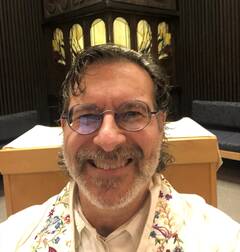March 2022
03/01/2022 10:01:31 AM
| Author | |
| Date Added | |
| Automatically create summary | |
| Summary |
 We are in the month of Adar ll and Purim occurs Wednesday, March 16 this year. We are commanded to be happy, to drink until we cannot distinguish between the name of Mordecai and Haman, and to enjoy the Purim-spiel, a play based on the Scroll of Esther.
We are in the month of Adar ll and Purim occurs Wednesday, March 16 this year. We are commanded to be happy, to drink until we cannot distinguish between the name of Mordecai and Haman, and to enjoy the Purim-spiel, a play based on the Scroll of Esther.
Where does the Purim-spiel tradition come from and how has it changed throughout the centuries?
Public reenactment of the story of Esther started in the early centuries C.E. with the hanging and burning of Haman in effigy by Levantine Jewish communities under Christian and then Muslim rule.
It was in medieval Europe, however, that the spiel got its start – in the larger cultural context of both Christian and secular folk entertainment, drama, carnival and parody. According to Yiddish historian Chone Shmeruk, the term Purim-spiel was found throughout Ashkenazic Jewry as early as the mid-1500s.
The early spiel could be simply a single actor presenting a poetic monologue, or later, a story portrayed by several actors. The play was usually the story of Esther, but also other biblical stories, such as the selling of Joseph, Hannah and Samuel, or David and Goliath were also portrayed. Midrash/Aggada (stories told by the sages which reflect or add to stories from the Torah) and commentary were also incorporated. There was always satire, directed at the rabbi, cantor, k'hilah (community) leaders, and others in authority. It was a way for Jews to express, under the guise of a play, their frustration and sometimes, anger, towards those in power.
In Italy, secular stories were added based on the characters of the Italian commedia del arte. Nahma Sandrow, author and theater/cultural historian, notes that the characters were either melded into the characters of the M’gillah or their stories placed between scenes of sacred texts. These characters created a subversive, sub-culture audience due to their suggestive themes and coarse language. The spiels became so bawdy that the rabbinic establishment had to sometimes ban them outright.
Purim-spiels were acted primarily by male students and musicians, while a few women performed as dancers and acrobats. Purim was the only day that men could cross-dress to play the women’s roles! They were performed either in large public venues like yeshivas, or especially for wealthy families, typically in their homes after the festive meal. In these homes the actors were rewarded in the form of money and/or food.
The spiel also included stock pan-European characters such as the marshalik (master of ceremonies), payats (clown), lets (jester), and nar (fool), to keep all entertained.
When the Haskalah (the Jewish Enlightenment of the 18th and 19th centuries) reached Eastern Europe, a whole new genre of parodies arose, written by maskilim (leaders of the Haskalah) against the traditionalists (Chassidic). This occurred when some Jews wanted a more modern, enlightened life, and saw the Chassidim as embracing traditions and rituals that were no longer appealing.
The oral tradition of passing on Purim-spiel dialog and songs, within families and through generations of performers, along with the passing down of costumes and props, means that many of these once-flourishing dramas have been lost. But the amateur folk quality of the Purim-spiel, and its ability to be ever-topical and irreverent towards synagogue clergy and lay leaders, along with relevant societal, cultural, and political observations, has guaranteed its survival to this very day! Modern spiel creators, often Rabbis and Cantors come up with themed musicals, changing the texts yearly to incorporate the most current issues, challenges, and frustrations, all amidst the story of Esther.
As you enjoy the performance of our Purim-spiel, Les Meshugenes, remember the power of words and this story of our people.
Cantor Fine
Wed, November 5 2025
14 Cheshvan 5786
Today's Calendar
: 10:00am |
: 4:30pm |
: 4:30pm |
: 6:00pm |
: 6:00pm |
: 6:00pm |
Friday Night
| Candle Lighting : 4:27pm |
: 5:30pm |
: 5:45pm |
: 6:30pm |
Shabbat Day
: 9:00am |
: 10:00am |
Upcoming Programs & Events
Nov 5 |
Nov 5 |
Nov 5 |
Nov 6 |
Nov 6 |
This week's Torah portion is Parashat Vayeira
| Shabbat, Nov 8 |
Candle Lighting
| Friday, Nov 7, 4:27pm |
Erev Hanukkah
| Sunday, Dec 14 |
Stay In The Know!
Get emailed our weekly Shabbat Shalom newsletters,
monthly bulletins, and/or committee announcements:

Privacy Settings | Privacy Policy | Member Terms
©2025 All rights reserved. Find out more about ShulCloud






